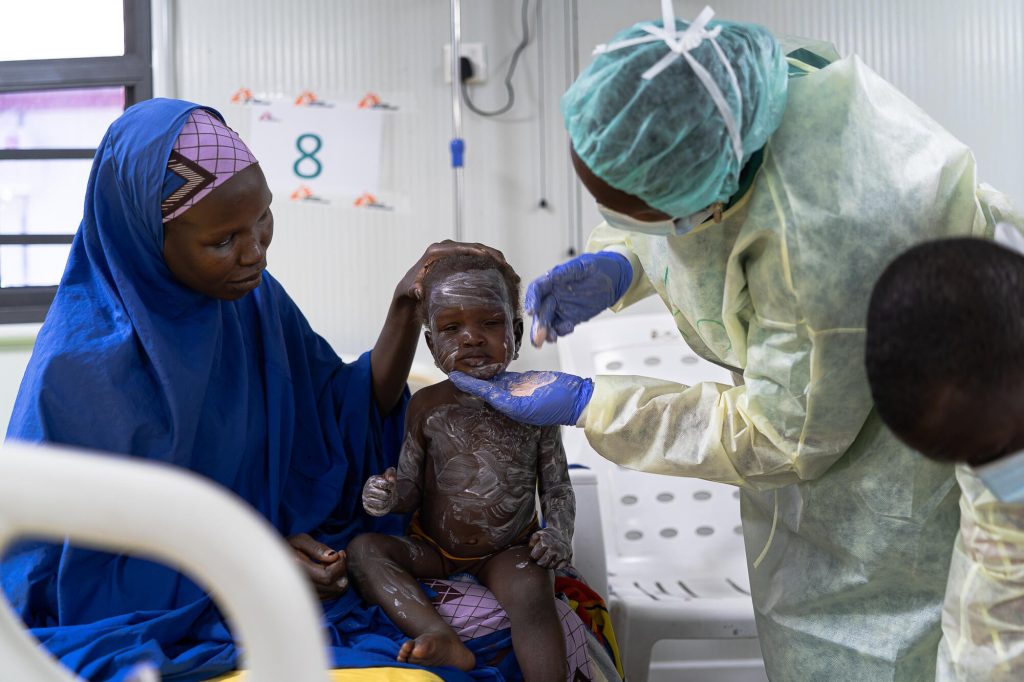Nigeria Grapples with Deadly Meningitis Outbreak Killing 151

A Silent Killer Strikes Northern Nigeria
In the dusty, sun-scorched villages of northern Nigeria, a silent killer stalks the population. Meningitis, a bacterial infection that inflames the protective membranes around the brain and spinal cord, has claimed at least 151 lives since October. For instance, health authorities now scramble to contain the rapidly spreading outbreak, which has struck hardest in remote areas. Children bear the brunt of the devastation. Consequently, the crisis, unfolding during Nigeria’s dry season, exposes deep vulnerabilities in the country’s healthcare system, leaving communities desperate for solutions.
The outbreak first emerged in October, creeping through 23 of Nigeria’s 36 states. By early April, the Nigeria Centre for Disease Control reported 1,826 suspected cases, with nearly half of the deaths-74-occurring this year alone. Kebbi and Sokoto states, nestled in the northwest, account for the majority of fatalities. Here, the disease thrives in the hot, arid climate, where low humidity and dusty winds create a perfect storm for transmission. Moreover, children, particularly boys aged 5 to 14, make up 60% of the victims, their small bodies succumbing to fever, headaches, and stiff necks within hours.
A Race Against Time
Consider Aisha, a 12-year-old girl from a rural village in Kebbi. One morning, she woke with a pounding headache and a fever that wouldn’t break. Her mother, Fatima, carried her for miles to the nearest clinic, only to find it short of vaccines and overwhelmed with patients. By nightfall, Aisha’s condition worsened, her neck rigid and her eyes glazed with confusion. Stories like hers echo across the north, where access to timely care remains a distant hope for many. Meningitis progresses swiftly, often deteriorating a patient’s condition in under 24 hours, leaving little room for delay.
Health workers describe the situation as a race against time. The bacteria, primarily Neisseria meningitidis, spreads through respiratory droplets-coughs, sneezes, or shared utensils in crowded households. In Nigeria’s northern regions, where extended families often live under one roof, containment becomes a daunting challenge. Furthermore, the dry season amplifies the risk, as dust irritates throats and weakens immune defenses. However, the outbreak’s ferocity stems not only from biology but also from systemic cracks in Nigeria’s healthcare infrastructure.
Systemic Challenges Hamper Response
Years of underfunding have left clinics in rural areas ill-equipped. For example, many lack basic supplies, like antibiotics or diagnostic tools, forcing patients to travel long distances for treatment. Vaccination coverage, a critical shield against meningitis, remains alarmingly low in some regions. The Men5CV vaccine, a pentavalent conjugate that protects against five strains of meningococcus, offers hope. Nigeria became the first country to roll it out in 2024, a milestone celebrated by the World Health Organization. Nevertheless, distribution lags in hard-to-reach areas, where poor roads and insecurity hinder delivery.
In early April, Nigeria received over one million doses of Men5CV from Gavi, the Vaccine Alliance, targeting individuals aged 1 to 29-the most vulnerable group. The campaign kicked off in Kebbi and Sokoto, with plans to expand to Yobe as more doses arrive. Health Minister Muhammad Pate called the shipment a “crucial milestone,” emphasizing its role in protecting children and young adults. Still, logistical hurdles persist. “We need mass vaccination campaigns now,” said Simba Tirima, Nigeria’s representative for Doctors Without Borders. “The most vulnerable are those who arrive too late to our facilities.”
Community Fears and Fragile Trust
The outbreak’s timing adds another layer of complexity. Nigeria’s health sector reels from recent U.S. aid cuts, ordered by the Trump administration in February, which have strained programs for outbreak response and immunization. For years, Nigeria leaned on such support to bolster its underfunded systems. Now, local partners scramble to fill the gap, describing the rise in fatalities as “alarming.” Additionally, the dry season, which typically fuels meningitis outbreaks, shows no signs of relenting, and health officials fear the toll could climb without swift action.
Communities, meanwhile, grapple with fear and misinformation. In some villages, myths circulate that meningitis stems from curses or contaminated water, delaying treatment as families turn to traditional healers. Health workers counter with awareness campaigns, urging parents to recognize symptoms early-fever, vomiting, sensitivity to light. Yet, trust in the system wanes when clinics turn patients away or lack the means to help. “We want to save our children,” said Ibrahim, a father in Sokoto who lost his son to the disease. “But where do we go when there’s nothing here?”
Signs of Hope Amid Crisis
Despite the grim outlook, glimmers of progress emerge. The Nigeria Centre for Disease Control has intensified surveillance, tracking cases to pinpoint hotspots. Mobile clinics now reach some remote areas, offering tests and treatment where hospitals are scarce. International partners, including Gavi and Doctors Without Borders, continue to funnel resources, though they warn that long-term solutions demand more than emergency aid. Therefore, strengthening Nigeria’s healthcare system—through better funding, trained staff, and widespread vaccination—remains the ultimate goal.
For now, the fight continues. In Maiduguri, a teaching hospital buzzes with activity as nurses tend to patients on crowded wards. One bed holds a young boy, his mother at his side, praying for recovery. Outside, the dry wind carries dust across the horizon, a reminder of the season’s unrelenting grip. Nigeria’s battle against meningitis is far from over, but its people press on, resilient in the face of adversity. Ultimately, the stakes are clear: every delay risks another life, another family torn apart by a preventable tragedy.
Health workers in Kebbi distribute meningitis vaccines to combat the outbreak.

